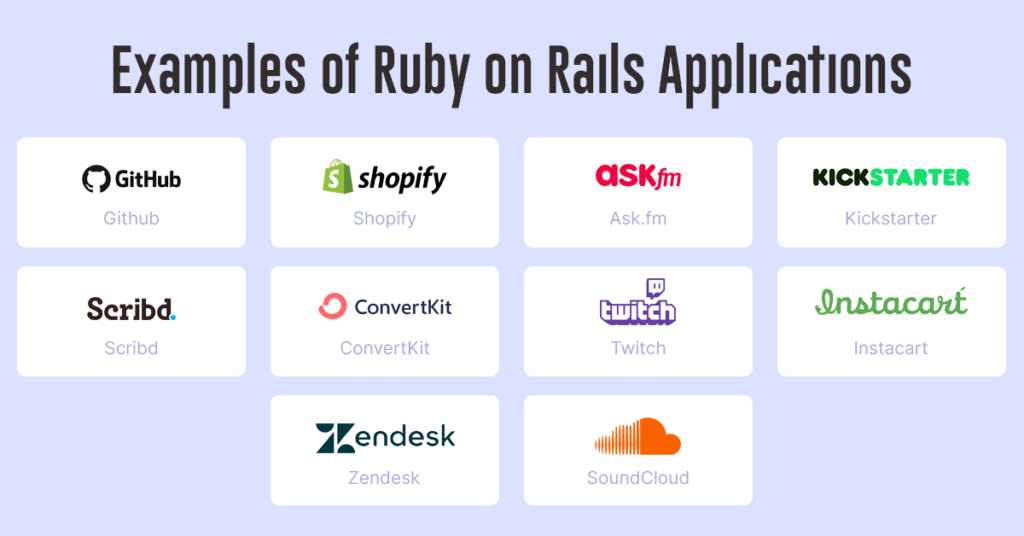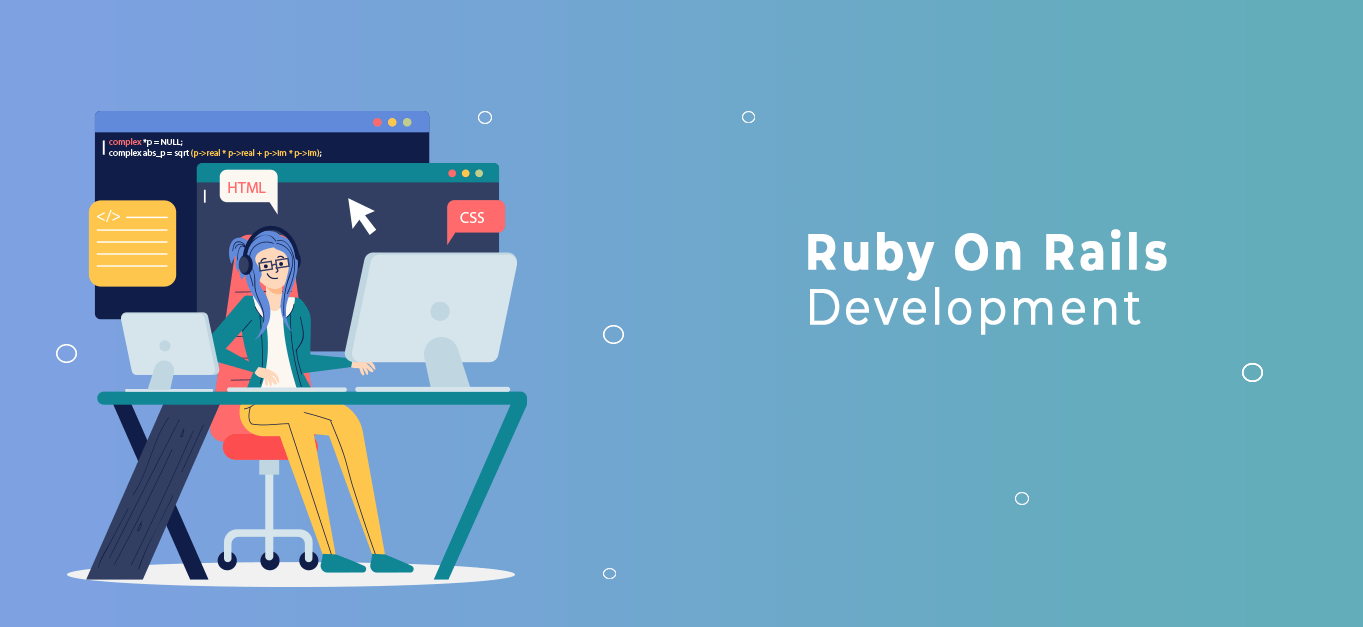Ruby on Rails
Ruby on Rails is a web application framework written in Ruby. It is designed to make web development easier by assuming what developers need to get started quickly. With Ruby on Rails, developers can write less code while getting more features compared to other languages and frameworks. Many experienced Rails developers find that it not only speeds up the development process but also makes it more enjoyable. The framework's conventions and built-in tools cut down on repetitive tasks, letting developers focus on creativity and problem-solving. This mix of efficiency and enjoyment has made Ruby on Rails popular in the web development community.
Ruby on Rails is opinionated software, meaning it strongly believes there's a "best" way to accomplish tasks and actively guides you towards that method. This framework is designed to help developers adopt what it considers the most efficient and effective practices, often discouraging alternative methods that deviate from its established conventions. By adhering to "The Rails Way," you can significantly boost your productivity because its conventions are specifically crafted to simplify development processes and reduce the cognitive load associated with decision-making for common tasks.
However, if you attempt to apply habits and practices from other programming languages or frameworks while working with Ruby on Rails, you might find the experience frustrating and more challenging. Ruby on Rails is meticulously optimized for its own set of methods and conventions, and straying from them can lead to complications and inefficiencies. Therefore, adapting to the Ruby on Rails philosophy is crucial for maximizing its potential and ensuring a smoother, more productive development experience. Embracing the Ruby on Rails way not only streamlines your workflow but also leverages the full power of the framework, allowing you to build robust applications more efficiently.

Well-known platforms like Basecamp, Shopify, and Airbnb are often praised for their fame and impact in project management, e-commerce, and hospitality. They have set standards with their innovative approaches and success. However, many other platforms and companies also deserve recognition for their contributions. These lesser-known entities have made significant progress in their fields, offering unique solutions and driving advancements in various sectors. Their stories and achievements are equally compelling and important, as they continue to shape the technology and business landscape in meaningful ways.
Ruby on Rails enhances developer productivity with a simple framework that eases coding. It adheres to best practices, improving code quality and maintenance. It accelerates web application creation with numerous tools and libraries for quick prototyping and deployment. Its convention over configuration approach reduces setup time, letting developers focus on features and functionality.

Ejaz Rasool
Software Team Manager
Ruby on Rails, commonly referred to as Rails, is an open-source web application framework developed in the Ruby programming language. Here are key insights into the customer experience with Rails:
Efficiency and Speed: Rails enables developers to create robust web applications swiftly. Its advanced features, such as table migrations and scaffolds, optimize the development process. Organizations value Rails for reducing application production time.
Structured Code Organization: Rails provides a default structure for code organization, enhancing workflow efficiency. It adheres to the Model-View-Controller (MVC) architecture and the “Don’t Repeat Yourself” (DRY) principle, promoting best practices in software development.
Mature Framework: Rails enjoys active support and is utilized by prominent companies including Airbnb, GitHub, Basecamp, Shopify, Soundcloud, and Goodreads.
In summary, Rails offers an efficient development experience, fosters best practices, and maintains its popularity in the realm of web application development.
Collecting data with Ruby on Rails involves several steps, especially for IoT applications. Ruby on Rails simplifies device communication with networking libraries like Socket. For more complex tasks, frameworks like EventMachine or Celluloid manage asynchronous programming and scalability. Ruby on Rails works with databases like MySQL and PostgreSQL for data storage. Use gems like Pandas or Daru for data analysis and visualization.
Real-time device communication often uses protocols like MQTT or WebSockets. Ruby frameworks like Faye or Action Cable support real-time interactions. Ensure secure communication with SSL/TLS and limit access to authorized users and devices. In summary, Ruby on Rails’ simplicity, expressiveness, and community-driven libraries make it a good choice for collecting and managing data in IoT applications.
Ensuring Business Continuity
Ruby on Rails supports business continuity through its inherent stability, scalability, rapid development capabilities, and robust maintenance practices.
One example of Ruby on Rails' stability in action is its ability to recover quickly from server crashes or outages, thanks in part to its built-in exception handling features.
The framework's stability ensures that applications run smoothly and reliably, minimizing downtime and disruptions.
This scalability also extends to application growth, thanks to Rails' modular architecture and support for horizontal scaling with tools like load balancers.
Its scalability allows businesses to handle increased loads and user growth without compromising performance.
For businesses, this means they can easily keep up with demand and traffic spikes without worrying about application performance slowdowns.
Rapid development is facilitated by Rails' convention over configuration philosophy, which accelerates the development process and reduces time to market.
The convention-over-configuration approach minimizes the time and effort required to set up a new project, letting developers focus on core functionality and business logic instead.
Additionally, robust maintenance practices, including a strong community support and regular updates, ensure that applications remain secure, up-to-date, and efficient over time.
This includes regular security patches and updates to address known vulnerabilities and improve overall performance.
This combination of features makes Ruby on Rails an excellent choice for businesses looking to maintain continuous and efficient operations.
.
Overall, Ruby on Rails' emphasis on stability, scalability, rapid development, and maintenance support make it a strong choice for businesses looking to streamline their operations and stay ahead of the competition.
Enhancing Cybersecurity
Ruby on Rails (RoR) employs several practices to enhance cyber security, ensuring that web applications built with this framework are robust and resilient against various threats. One of the key practices is the use of strong parameter filtering, which helps prevent mass assignment vulnerabilities by requiring explicit declaration of which parameters are permitted.
Additionally, RoR incorporates built-in protection against SQL injection attacks by using parameterized queries, which ensures that user input is properly sanitized before being executed in the database. Furthermore, the framework includes Cross-Site Request Forgery (CSRF) protection by default, which helps prevent unauthorized commands from being transmitted from a user that the web application trusts.
RoR also supports secure password storage by utilizing bcrypt, a hashing algorithm that makes it computationally expensive for attackers to crack passwords. Moreover, the framework encourages the use of HTTPS to encrypt data transmitted between the client and server, safeguarding sensitive information from being intercepted. By integrating these and other security measures, Ruby on Rails provides developers with a solid foundation to build secure web applications.

Django integrates a suite of security features designed to mitigate cyber threats. The framework's templating system automatically escapes potentially harmful characters, thereby minimizing the risk of XSS attacks. Nonetheless, developers must exercise caution when processing user-generated content within templates.
To prevent unauthorized form submissions, Django validates each POST request against a secret token, ensuring that malicious actors cannot exploit form replays with another user's credentials. The ORM in Django sanitizes database queries, effectively protecting against SQL injection vulnerabilities. Additionally, Django sets appropriate headers to counteract clickjacking threats. Utilizing HTTPS with Django further enhances security measures. While Django offers robust security mechanisms, it is imperative for developers to adhere to best practices and remain vigilant about new and evolving threats.
Shopify employs Ruby on Rails as its primary programming language, a strategic choice that enhances its speed and reliability over other eCommerce platforms. The Rails framework facilitates extensive customization, enabling developers to easily add or modify functionalities as required. For those interested in developing a Shopify app using Ruby on Rails, tools such as ngrok can be utilized to test local app changes within your Shopify store.






